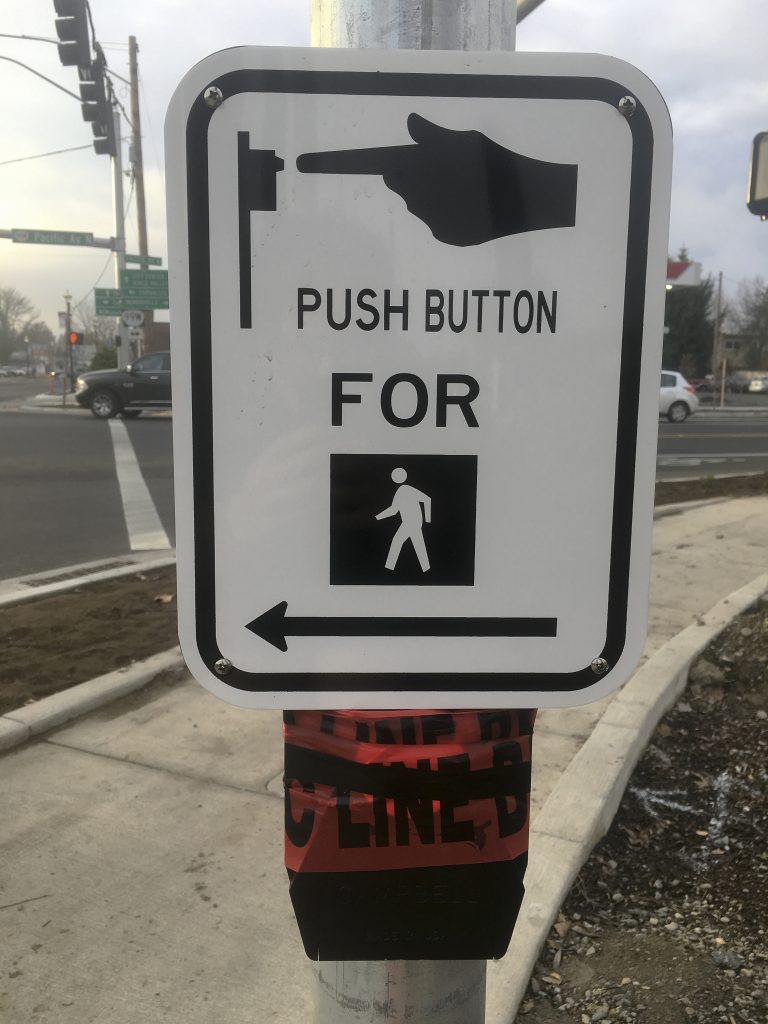
Sage Kiernan-Sherrow | News Editor
As the DeafBlind population increases within Monmouth, discussion about accessibility has increased, and small changes have been implemented to promote that accessibility. One such change is the addition of Accessible Pedestrian Signals (APS) at the intersection of Main Street and Highway 99, which was made possible through the advocating of several parties, including Jelica Nuccio.
Jelica Nuccio is a DeafBlind individual who moved to Monmouth a year ago from Seattle, Washington, bringing her business “Tactile Communications” with her. Tactile Communications focuses on, “providing education to individuals that are DeafBlind as far as adaptive skills and reading in Braille.
“For many people, if they’ve grown up visual, then when they become DeafBlind, they need to incorporate touch-based strategies to get information. So, we do a lot of training…” Nuccio said, likening the training to learning how to drive a car.
Training also includes learning how and when to cross the road safely — now made easier through the APS system.
Nuccio credited Amy Parker, the coordinator of the Orientation and Mobility program at Portland State University, with garnering support from the City Council and the Department of Transportation to implement the APS system.
“It became much more complex than originally anticipated,” Nuccio stated.
Despite this beneficial addition, there are still more ways to improve accessibility in the community. Nuccio mentioned adding additional APS systems along Main Street, more stop signs to increase driver awareness, bumps on the road serving as tactile markers, English and Braille combined menus and mats in front of doorways acting as signifiers as improvements that could be made.
“We’re hoping that with more visibility, that will create more awareness, and that will create a more unified front and we can actually start making some of these significant changes, but they haven’t happened yet,” said Nuccio.
Despite the need for improvements, Nuccio relayed feeling welcomed in Monmouth, saying that “there’s a different kind of patience here … people are just very welcoming, and they’re immediately talking about what they can do to change the community and make it more accessible.”
She said that she moved from Seattle to Monmouth after visiting Monmouth for work-related purposes where she was surprised to enter a restaurant and have a waitress immediately begin communicating with her in protactile.
“I immediately felt so comfortable and comforted in knowing that people understood that I communicate through touch,” Nuccio said.
For students interested in learning about DeafBlind culture and protactile communication, Nuccio recommended they take Professor CM Hall’s class in Winter Term and Nuccio’s own class taught in Spring Term, which is entirely taught in protactile.
“Protactile is not the same as hearing a language or seeing a language — there’s no book on it. You can’t write a book on how something feels or how to communicate tactilely, so it would be very difficult to explain even in a video. So, all of the instructions has to be done in person,” Nuccio said.
For those seeking a creative, immersive experience, a PT play will be held on Dec. 14.
“In protactile theater everything is communicated by touch, so you don’t see anything or hear anything — this is a brand new thing that has just occured in our community and it’s blossoming,” said Nuccio.
Those interested can RSVP at TcPTPlays@gmail.com.
To conclude, Nuccio stated, “I’m just as human as everyone else, I just have different means of communication. But different, doesn’t mean separate. We can all communicate with each other.”
For more information on who Jelica Nuccio is and what she does, visit https://www.tactilecommunications.org/.
Contact the author at howlnews@wou.edu
Photo by Sage Kiernan-Sherrow

